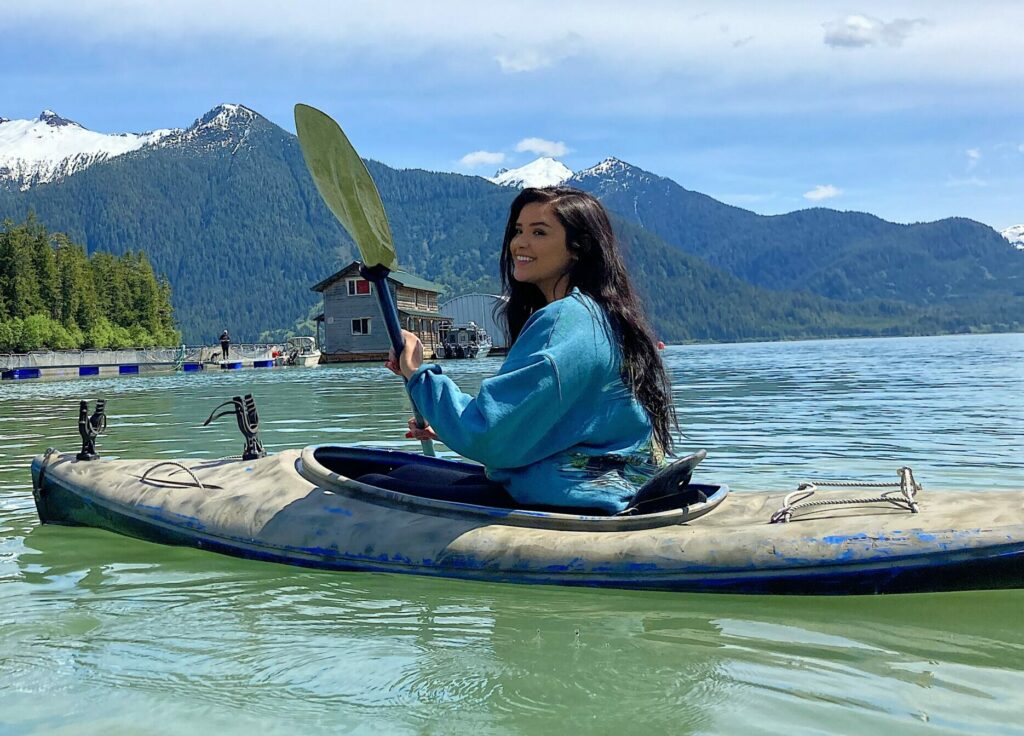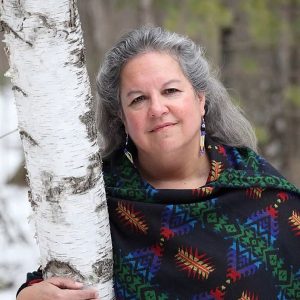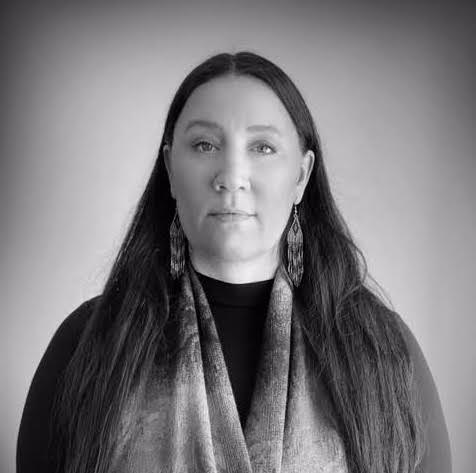
What is Wrong with Me? with Keyana Pardilla, Robin Wall Kimmerer, and Sherri Mitchell
In this episode of the Climate Changed podcast, you will experience:
- A centering practice: Sean Dague helps us envision a world without fossil fuels.
- A conversation with Keyana Pardilla
- Excerpts from live BTS Center Zoom programs featuring Robin Wall Kimmerer and Sherri Mitchell
- Next Steps for Engaged Hope
About Keyana Pardilla
 Keyana Pardilla graduated in 2020 from the University of Maine with a bachelor's degree in marine science. She grew up on a Penobscot reservation where she continues to live. Her current work is in the Youth Engagement Division at Wabanaki public health and wellness.
Keyana Pardilla graduated in 2020 from the University of Maine with a bachelor's degree in marine science. She grew up on a Penobscot reservation where she continues to live. Her current work is in the Youth Engagement Division at Wabanaki public health and wellness.
Keyana describes herself this way: “My name is Keyana Pardilla and my pronouns are she/her. I belong to where the rocks widen otherwise known as the Penobscot Nation. I come from an indigenous background. I love science and education. I also practice some traditional forms of art, like beading. I love to paint, and I also am starting to learn how to weave some baskets, some traditional baskets. I am also a dog mom of two rescue pups. I love to go outdoors and explore nature. I have a bachelor's degree in marine science. I'm very passionate about the ocean and how we can combat climate change.”
About Robin Wall Kimmerer
 Robin Wall Kimmerer is a mother, scientist, decorated professor, and enrolled member of the Citizen Potawatomi Nation. She is the author of the widely acclaimed book Braiding Sweetgrass: Indigenous Wisdom, Scientific Knowledge and the Teaching of Plants. Her first book, Gathering Moss: A Natural and Cultural History of Mosses, was awarded the John Burroughs Medal for outstanding nature writing, and her other work has appeared in Orion, Whole Terrain, and numerous scientific journals.
Robin Wall Kimmerer is a mother, scientist, decorated professor, and enrolled member of the Citizen Potawatomi Nation. She is the author of the widely acclaimed book Braiding Sweetgrass: Indigenous Wisdom, Scientific Knowledge and the Teaching of Plants. Her first book, Gathering Moss: A Natural and Cultural History of Mosses, was awarded the John Burroughs Medal for outstanding nature writing, and her other work has appeared in Orion, Whole Terrain, and numerous scientific journals.
She tours widely and has been featured on NPR’s On Being with Krista Trippett. In 2015, she addressed the General Assembly of the United Nations on the topic of “Healing Our Relationship with Nature.” Kimmerer lives in Syracuse, New York, where she is a SUNY Distinguished Teaching Professor of Environmental Biology, and the founder and director of the Center for Native Peoples and the Environment. as part of Rob Shetterly’s “Americans Who Tell the Truth” series.
About Sherri Mitchell
 Sherri Mitchell – Weh’na Ha’mu Kwasset, is a Native American attorney, teacher, activist and change maker who grew up on the Penobscot Indian Reservation. She is the author of the award-winning book Sacred Instructions; Indigenous Wisdom for Living Spirit-Based Change, and is the visionary behind the global healing ceremony Healing the Wounds of Turtle Island, which has brought people together from six continents with a commitment to heal our collective wounds and forge a unified path forward.
Sherri Mitchell – Weh’na Ha’mu Kwasset, is a Native American attorney, teacher, activist and change maker who grew up on the Penobscot Indian Reservation. She is the author of the award-winning book Sacred Instructions; Indigenous Wisdom for Living Spirit-Based Change, and is the visionary behind the global healing ceremony Healing the Wounds of Turtle Island, which has brought people together from six continents with a commitment to heal our collective wounds and forge a unified path forward.
Sherri is the founding director of the Land Peace Foundation, an organization dedicated to the protection of Indigenous land, water, and religious rights, and the preservation of the Indigenous way of life. She is an alumna of the American Indian Ambassador Program and the Udall Native American Congressional Internship Program. Her rights-based work has earned her the Mahoney Dunn International Human Rights and Humanitarian Award, the Spirit of Maine Award for International Human Rights, and the Peace and Justice Center’s Hands of Peace award.
Sherri has been a longtime advisor to the American Indian Institute’s Traditional Circle of Indian Elders and Youth and was a program coordinator for their Healing the Future Program. She has also served as an advisor to the Indigenous Elders and Medicine People’s Council of North and South America for the past 20 years and is a consultant and Advisory Committee member for Nia Tero’s International Indigenous Land Guardianship Program.
Sherri works at the intersections of our times, where she artfully weaves complex concepts into one unifying whole. She currently speaks and teaches around the world on a multitude of issues, including: Indigenous rights, environmental justice, and Spirit-Based Change.
Some Highlights from the Conversation
“Just imagine this whole new world. Because if we can't imagine this world, we can't create it.” – Sean Dague, Citizens Climate Lobby.
As part of the Centering Practice, Sean leads us through a thought experiment about envisioning a world without fossil fuels. He invites us to engage each one of our senses to see, smell, hear, and feel the world in a new way.
“I would pick up on these feeling of melancholy, because their stories would always end up with, ‘But that's not how we do it anymore, or what we can't go there anymore, or simply just a lot has changed since then.’” – Keyana Pardilla
Growing up in the Penobscot Nation, otherwise known as Indian Island, a small island located in Old Town Maine, Keyana speaks with elders as she seeks to find what was lost and bring this awareness to younger people.
“But we are embedded In a world of relatives, relatives, not natural resources.” – Robin Wall Kimmerer
In talking about gratitude, Kimmerer shares a way to connect with all living things that is built on relationships, love, and care. She invites us to expand our spiritual imaginations.
“…the process of feeling the pain, the process of feeling the anxiety, the process of feeling the grief, the process of feeling the loneliness, is part of our connectivity to life, where the natural world is really amplifying the signal so that we once again feel our connection to the rest of life…” –Sherri Mitchell
The title of this episode, What is Wrong with Me? comes from an observation Mitchell made during the beginning of the COVID-19 Pandemic. In a society that seeks to alleviate negative feelings, she invites us to consider how these strong emotions of pain, grief, and loneliness may be echoes of distress from the natural world.
Next Steps for Engaged Hope
- Share this conversation with someone who you think will appreciate it. Email or text them a link to today’s episode or post it on social media. If what you heard here today moved you, likely it will also move one of your friends. And as a trusted source, your opinion matters to your friends.
- You can make a difference by making a donation. we suggest Wabanaki Reach, a powerful organization that advocates for the Wabanaki tribes in Maine through education, truth telling restorative justice, and restorative practices
Climate Changed is a podcast about pursuing faith, life, and love in a climate-changed world. Hosted by Nicole Diroff and Ben Yosua-Davis. Climate Changed features guests who deepen the conversation while also stirring the waters. The Climate Changed podcast is a project of The BTS Center. The show is produced by Peterson Toscano.

